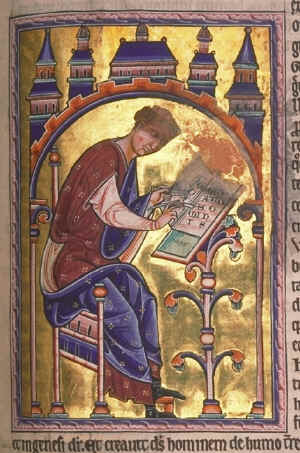|
|||
|---|---|---|---|
| This weekly bulletin insert complements the curriculum published by the Department of Christian Education of the Orthodox Church in America. This and many other Christian Education resources are available at http://dce.oca.org. | |||

Saint Isidore, Bishop of Seville, Spain was born into a prominent family in Carthagena, Spain in the sixth century. Not only were he and his relatives members of the nobility, they were also pious Christians. His sister Florentina and his brothers Fulgentius and Leander (both bishops) are all saints. Isidore wrote that Leander was one of his greatest teachers, and in this his experience was similar to that of Gregory of Nyssa, whose siblings also are saints of the Church. Gregory benefited from the teaching of his siblings, and gratefully described the good influence and instruction of his sister Macrina and his brother Basil. But Isidore, as a young boy, had a serious problem that the studious Gregory never encountered. Isidore did poorly in school, and hated studying. He resented the hard work it required and the harsh methods some teachers (including his brother Leander) used. He was so disheartened by his lack of success as a student that he ran away from school. After several hours of walking, he sat down to rest by a roadside spring. Isidore noticed a large stone that had been hollowed out by the constant dripping of water. Even though each drip was very small, over time the drips had added up to a force that was stronger than the hard stone. Isidore thought about that stone for a long time, and decided to take what he saw as a lesson about his studies. If he applied himself, and said "no" to his own tendency to avoid rigorous effort, he could little by little overcome the "stone" of ignorance. He decided to practice that "no" by studying hard. He returned to school with a new determination. Using his natural abilities, which were very strong when he applied them, he worked hard, endured Leander's discipline, and became one of the most knowledgeable young men of his time. Isidore's learning would become very important in later years, during which he served the Church first as a priest and then as Bishop of Sevillle, following Leander in that position. He became skilled at telling people about Jesus Christ in ways they could understand. Because of this, he was able to bring many who followed the Arian heresy back to the true faith, and greatly weakened the influence of Arianism all over Spain. Wanting others to be able to do the same, he encouraged the widespread establishment of seminaries and schools. Like most true scholars, Isidore didn't confine himself to a narrow focus but studied a broad range of topics. His book "Etymologies" has been described as a compendium or collection of "all human knowledge" of his time. the breadth of his interests shows in his words about music: "And without music there can be no perfect knowledge, for there is nothing without it. For even the universe itself is said to have been put together with a certain harmony of sounds, and the very heavens revolve under the guidance of harmony." |
|||
